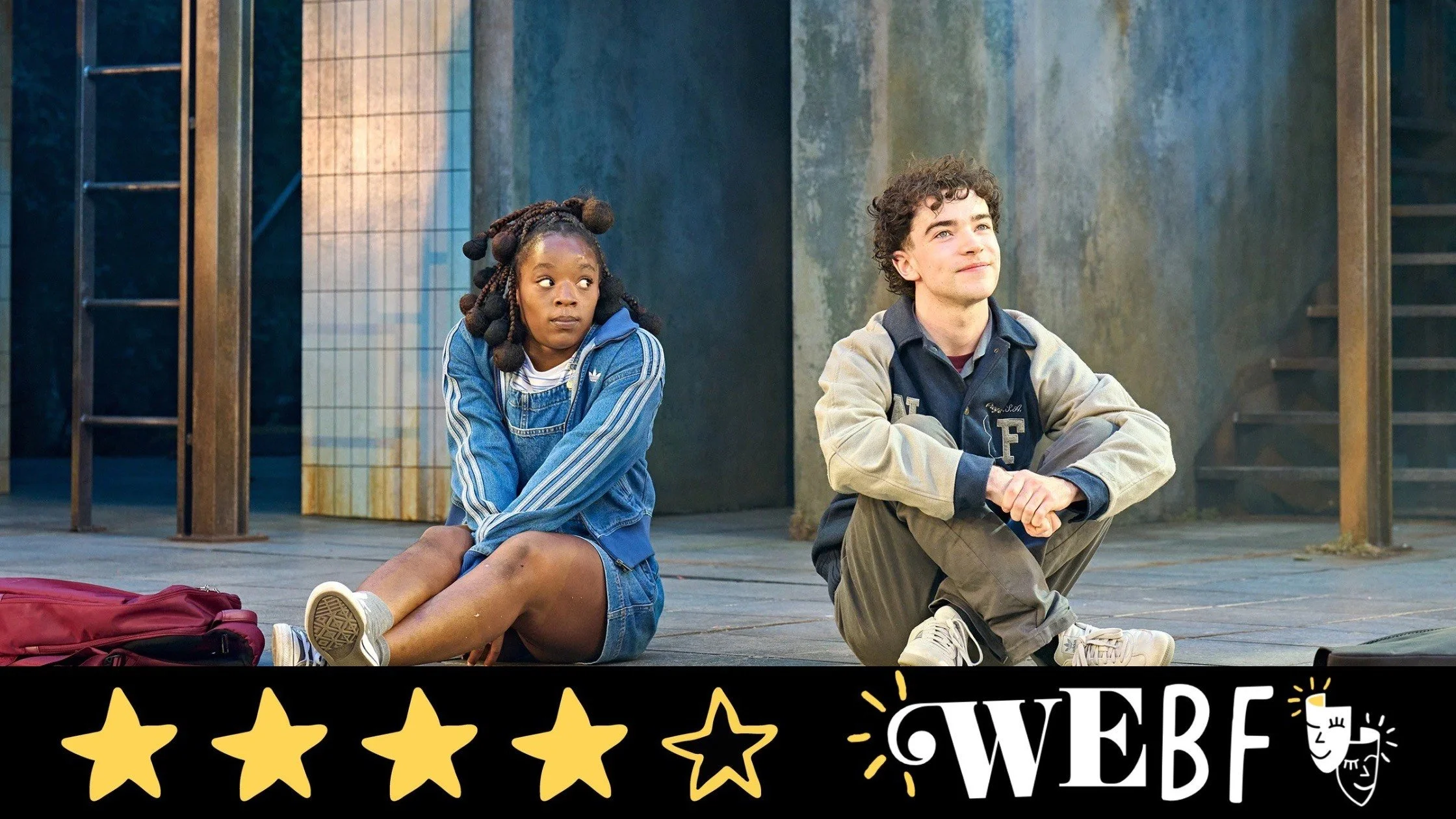Review: NOUGHTS & CROSSES, Regent’s Park Open Air Theatre
Photo credit: Manuel Harlan
Dominic Cooke’s stage adaptation of Malorie Blackman’s ground-breaking novel Noughts & Crosses, directed with clarity and purpose by Tinuke Craig, lands with power and urgency at Regent’s Park Open Air Theatre.
First published in 2001, Blackman’s story imagines a world in which racial roles are reversed, where Black ‘Crosses’ hold power and white ‘Noughts’ are marginalised. The narrative follows the forbidden relationship between Sephy and Callum as they navigate love, identity and systemic injustice.
The open-air setting adds a raw energy to the production, framed by Colin Richmond’s towering, rusted industrial set, a brutal and imposing symbol of a divided society. A few well-chosen pieces of furniture, such as school chairs or a single bed, are used with clarity to signify specific locations. A white LED border appears only around Callum’s family home or during moments involving the punishment of Noughts, subtly suggesting surveillance, control and the harsh scrutiny placed on the oppressed.
The production opens with impact, as Corinna Brown (Sephy) and Noah Valentine (Callum) run in from the audience, immediately convincing as teenagers. Brown is exceptional. She brings Sephy’s spirit to life with vibrant energy, capturing both her youthful enthusiasm and emotional depth with impressive control. Her diction is crisp, and her pacing mirrors the emotional rhythm of a 14-year-old navigating a fractured world. There is something incredibly raw yet precise in her performance - wide-eyed, hopeful, conflicted and magnetic.
Valentine is equally outstanding as Callum. His heavy London accent, slower pacing and grounded presence creates a clear class contrast and give his performance real grit. He portrays Callum’s quiet intensity with remarkable nuance, allowing his internal conflict and growing sense of injustice to bubble beneath the surface. His transformation over the course of the play is striking, from vulnerable schoolboy to desperate young man. Every shift feels earned and heartbreaking.
Together, Brown and Valentine are the beating heart of the production. Their chemistry is palpable and their connection entirely believable. Whether in moments of youthful joy or painful confrontation, their bond feels deeply lived-in. By the final scenes, they have earned every tear. Both deliver phenomenal performances that elevate the entire production.
The reversed racial hierarchy is presented in ways that are intentionally uncomfortable. The use of slurs like “blanker” lands with weight, mirroring real-world injustice and forcing the audience to reflect. A harrowing scene in which Sephy is attacked for wanting to sit with Callum is particularly difficult to watch due to its realism.
Alec Boaden gives a chilling performance as Jude, simmering with resentment and danger. Kate Kordel brings emotional depth to Meggie, while Chanel Waddock leaves a lasting impression as Lynette. Her character begins as slightly unhinged, caught in a fog of denial and detachment. In one particularly striking moment, she shifts entirely. Moving energetically around the stage, she delivers her final monologue with a bright, almost euphoric tone. The contrast between her sense of clarity and freedom and her family’s devastation, Callum sobbing, Meggie collapsing in grief, creates a jarring emotional divide. It is a powerful visual and emotional moment that captures the tragedy of a character who finally feels peace in a world that never accepted her.
The ensemble often remains on stage, observing from opposite sides. It is a simple but effective way of reinforcing the central theme of division. Max Pappenheim’s sound design and DJ Walde’s score maintain tension and rhythm, while Ingrid Mackinnon’s movement direction keeps the staging fluid and expressive. The shopping centre bombing is especially memorable, using slow motion, smoke and sound to immerse the audience in chaos.
While the time spent with Sephy and Callum as teenagers is engaging and necessary, the contrast in Act Two is stark. The audience is given little time to witness their growth into young adults or to feel the shift in their relationship from childhood affection to complex, adult love. The emotional development feels compressed, and though the performances remain strong, the writing doesn’t allow their adult selves the same space to unfold as their younger ones.
The second half is filled with high-stake developments and emotional shifts, but they come so rapidly that the audience has little time to process the weight of each moment. While this likely reflects the limitations of adapting such a layered novel for the stage, the pacing does reduce the emotional depth of some key scenes. With just a little more space to breathe, this could easily have been a five-star production.
The production is supported by an exceptional creative team, including Hazel Holder’s voice work, Joshua Pharo’s lighting and RC Annie’s fight direction. Cooke’s adaptation captures the emotional intensity and social commentary of Blackman’s novel with respect and boldness. Every element works in service of telling this story with truth and urgency.
Despite some compression in the latter half, this remains a bold and deeply moving production. It holds a mirror to our world and asks difficult questions about power, privilege and love. The standing ovation was more than deserved. A beautifully performed, visually striking production that leaves a lasting impact.
**** Four stars
Reviewed by: Laura Harris
Noughts & Crosses plays at Regent’s Park Open Air Theatre until 26 July, with further info here.


